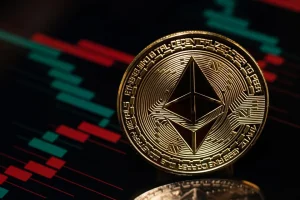In recent years, the blockchain industry has witnessed the emergence of various innovative concepts and technologies that are transforming traditional systems. One such concept that has gained significant attention is P2E, which stands for Play-to-Earn. P2E refers to a revolutionary model that combines gaming and blockchain technology, allowing players to not only enjoy immersive gaming experiences but also earn real-world rewards and assets. In this article, we will delve into the world of P2E, exploring its meaning, features, and the impact it is making in the blockchain industry.
Understanding P2E: What Does P2E Stand For In The Blockchain Industry?
P2E, or Play-to-Earn, is a gaming model that enables players to earn valuable rewards, digital assets, or cryptocurrencies by actively participating in games built on blockchain technology. Unlike traditional gaming, where players invest time and money into games without any tangible returns, P2E games introduce an economic system where in-game achievements and activities translate into real-world value.
How P2E Works
P2E games are built on blockchain platforms that provide transparency, security, and decentralized ownership of assets. These games utilize non-fungible tokens (NFTs) and cryptocurrencies as the basis for in-game items, characters, and rewards. Players can acquire these digital assets through gameplay, achievements, or by purchasing them from other players or the game’s marketplace. These assets can then be traded, sold, or used in other games, creating an ecosystem where players have true ownership and control over their virtual possessions.
Benefits of P2E
- Earn While Playing: P2E games provide players with the opportunity to earn real-world value for their time and efforts spent in the virtual world. This opens up new avenues for individuals to monetize their gaming skills and make a sustainable income.
- True Ownership: Unlike traditional games where in-game items are owned by the game developers or publishers, P2E games utilize blockchain technology to ensure that players have complete ownership and control over their digital assets. This enables players to freely trade, sell, or use their assets across various platforms.
- Financial Inclusion: P2E games have the potential to promote financial inclusion by allowing individuals, especially in developing regions, to participate in the global digital economy. Players can earn income and accumulate assets through gameplay, providing them with opportunities for economic empowerment.
- Community and Collaboration: P2E games foster a vibrant and engaged community of players who collaborate, compete, and trade with each other. This sense of community enhances the gaming experience and opens up avenues for social interaction and cooperation.
Methods of Earning in P2E
- In-Game Achievements: Players can earn rewards by completing quests, reaching milestones, or achieving high scores within the game. These rewards can be in the form of digital assets, cryptocurrencies, or other in-game benefits.
- Virtual Asset Trading: P2E games often feature a marketplace where players can buy and sell their in-game assets with other players. This creates a secondary market for virtual assets, allowing players to profit from their acquired items.
- Staking and Yield Farming: Some P2E games offer staking mechanisms where players can lock their in-game assets or cryptocurrencies to earn additional rewards. Yield farming allows players to earn passive income by providing liquidity to decentralized finance (DeFi) protocols within the game ecosystem.
- Tournaments and Competitions: P2E games often organize competitive events and tournaments where players can showcase their skills and earn rewards based on their performance. These competitions can offer substantial prizes and recognition.
How To Exchange P2E Profits For Fiat Here At DartAfrica
Here at DartAfrica, we provide an effortless and highly beneficial way for you to convert your crypto assets to fiat that you can withdraw to your local bank account instantaneously. Over a very short time, we have been able to drive an innovative and ever-expanding cryptocurrency trading platform that aims to make trading pleasant and easy for users in Ghana and Nigeria (for the time being) to sell cryptocurrencies for fiat. We at Dartafrica offer unparalleled support for our customers so they can exchange popular cryptocurrencies like USDT, USDC, ETH, and BTC, plans have been in motion already to increase this selection in order to cater to a wide range of consumers with various preferences. One of the many potential benefits of exchanging your cryptocurrency for Naira or Cedis with us at DartAfrica is the fact that there are no transaction fees, unlike other exchange platforms or traditional banking institutions.
Our user-friendly platform provides consumers a simple navigation, a quick and secure way to perform transactions. To efficiently use DartAfrica:
- Visit our website to register in just a few simple steps.
- Create a transaction pin by logging into your account and selecting “Security” to authorize withdrawals.
- For instructions on creating a local bank account, click “Account Details”.
- Choose the coin you want to deposit by clicking “Sell Coins.” Put the USD amount (at least $20).
- By selecting “Sell Now,” you will be given a QR code and wallet address to deposit the equivalent amount you intend to sell. After two block confirmations, the corresponding amount of fiat is transferred into your account. You may track your transaction in the “Trades” area until the deposit is complete. You can see this on your “Dashboard.”
- To withdraw money to the account you’ve previously set up in step 3, click “Withdraw funds,” then enter the desired amount. Without any additional fees, your local bank receives a quick credit.
By utilizing our services at DartAfrica, you can enjoy a seamless and efficient way to exchange cryptocurrency for fiat, benefiting from a user-friendly platform, quick transactions, and the absence of transaction fees. Experience the convenience and reliability of DartAfrica for all your crypto-to-fiat conversions.
P2E, or Play-to-Earn, has emerged as a groundbreaking concept in the blockchain industry, revolutionizing how we perceive gaming and virtual economies. By integrating blockchain technology, P2E games allow players to earn real-world value, enjoy true ownership of digital assets, and participate in a global community. As the P2E ecosystem continues to grow and evolve, it has the potential to reshape the gaming industry, promote financial inclusion, and empower individuals worldwide.
Disclaimer: The information provided in this article is for educational and informational purposes only and should not be considered financial or investment advice. Always do thorough research and seek professional guidance before participating in P2E games or investing in cryptocurrencies.





